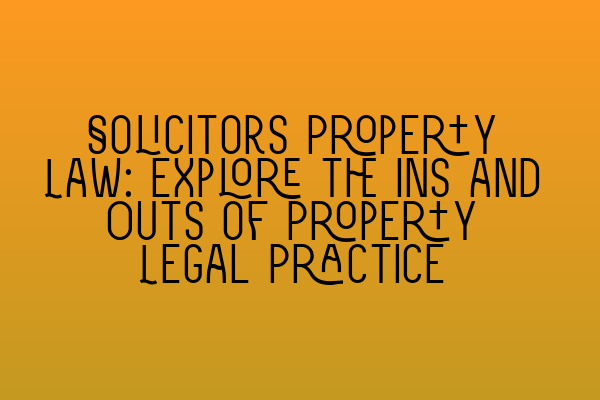Solicitors Property Law: Explore the Ins and Outs of Property Legal Practice
When it comes to property transactions, having the guidance of a skilled solicitor is crucial to navigate the complex world of property law. If you’re considering a career in property law or are in need of legal advice for a property matter, it’s essential to understand the role of a solicitor in property transactions and the various aspects of property law they handle.
What Does a Property Law Solicitor Do?
A solicitor specializing in property law assists individuals and businesses in all aspects of property transactions and disputes. Their primary responsibilities include:
- Conveyancing: A property law solicitor handles the legal process of transferring ownership of a property from one party to another. This involves conducting searches, preparing contracts, and ensuring all legal requirements are met.
- Lease Transactions: If you’re involved in leasehold property, whether as a tenant or a landlord, a property law solicitor can help you negotiate, draft, and review lease agreements.
- Property Disputes: In case of property disputes or disagreements, a property solicitor can provide legal advice and represent you in court if necessary. This includes boundary disputes, landlord-tenant disputes, and disagreements over property ownership.
- Real Estate Finance: If you’re looking to finance a property purchase or investment, a property law solicitor can help you understand the legalities involved and assist in securing the necessary financing.
- Property Development: Solicitors specializing in property law also work with property developers, providing legal advice regarding land acquisitions, planning permission, construction contracts, and more.
As property law covers a wide range of areas, solicitors often specialize in specific aspects to provide expert advice to their clients. Whether you’re a first-time buyer, a property investor, or a business owner, having a solicitor who understands your needs and has expertise in the relevant area of property law can make a significant difference in your property transactions.
Choosing the Right Property Law Solicitor
When selecting a property law solicitor, it’s important to consider a few key factors:
- Experience: Look for a solicitor with ample experience in property law. Experienced solicitors have a deep understanding of the intricacies of property transactions and can navigate potential challenges effectively.
- Track Record: Research the solicitor’s track record and client testimonials. A good solicitor will have a history of successful property transactions and satisfied clients.
- Communication: Effective communication is vital in any legal matter. Choose a solicitor who communicates clearly, keeping you informed at every stage of the process.
- Transparency: Ensure the solicitor provides transparent information regarding their fees, making it easier for you to budget for the legal services rendered.
By considering these factors, you can find a property law solicitor who is the right fit for your specific needs and ensures a smooth and efficient property transaction process.
The Importance of SEO in Property Law Solicitors’ Websites
In today’s digital age, having a strong online presence is essential for any business, including property law solicitors. One of the key components of a successful online presence is search engine optimization (SEO). Property law solicitors must optimize their websites to increase visibility in search engine results and attract potential clients. Here are some important SEO factors to consider:
- Keyword Research: Conduct thorough keyword research to identify the most relevant and effective keywords for your website. This will help you understand what potential clients are searching for and tailor your content accordingly.
- On-Page Optimization: Optimize your website’s content by incorporating relevant keywords in titles, headings, meta descriptions, and throughout the body of your web pages.
- High-Quality Content: Create informative and engaging content that not only appeals to search engines but also provides value to your website visitors. This could include blog posts, FAQs, and guides related to property law.
- Link Building: Build quality backlinks to your website from reputable sources. This can be achieved through guest posting, collaborating with other relevant websites, and creating shareable content.
- Local SEO: If you operate in a specific geographic area, optimize your website for local searches by including location-specific keywords and ensuring your business information is consistent across online directories.
Implementing these SEO strategies can help your property law solicitor website rank higher in search engine results, increasing your online visibility and attracting more potential clients.
Conclusion
Property law solicitors play a crucial role in property transactions and disputes, helping individuals and businesses navigate the complexities of property law. By understanding the various responsibilities of property law solicitors and choosing the right solicitor for your needs, you can ensure smooth and successful property transactions.
In addition, taking advantage of effective SEO practices can further enhance your online presence and attract more clients to your property law solicitor business. By conducting thorough keyword research, optimizing your website’s content, and implementing other SEO strategies, you can increase your visibility in the competitive online landscape.
To prepare for a career in property law or to enhance your knowledge in this field, consider exploring our SQE 1 Practice Exam Questions and SQE 1 Practice Mocks FLK1 FLK2. We also offer comprehensive SQE 2 Preparation Courses and SQE 1 Preparation Courses to help you succeed in your legal career. Stay updated with the latest SRA SQE Exam Dates and take the first steps towards becoming a qualified property law solicitor.
